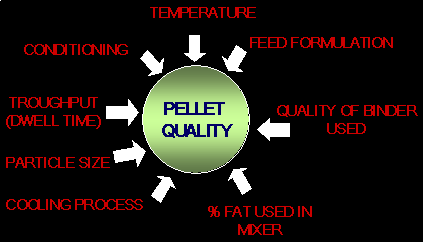Dinapell ®
Advanced Pellet Binding Technology
Dinapell is a binding and waterproofing agent developed specifically, but not exclusively, for use in cattle, fish and shrimp feeds as allowed by local regulations and law. In the USA the use of condensed type polymers such as Dinapell, is not allowed for feeds destined for aquatic species consumed in the USA. Please read and understand Material Safety Data Sheet before using and check your local regulations covering the use of a pellet binder.
Feed consumers waste millions of dollars due to non-utilized feed, wasted through broken pellet fines, dissolved aquaculture pellets and wasted mash.
WE OFFER THE SOLUTION — DINAPELL
Factors Affecting Pellet Quality
Multi-walled kraft paper bags with a high density P.E. interiot liner with airtight side valve closure mechanism preserves DINAPELL’s superior quality and efficacy over a longer period of time than competitors’ products. Lost product due to caking will be a thing of the past once you start using DINAPELL !
Dinapell guarantees you a shelf life of at least one year during storage.
GENERAL OVERVIEW
- About 60 million tons of animal feed is pelleted in the U.S.A. each year.
- Feed is 50-80% of total production costs.
- Industry losses due to fines range from 1-3%.
- Feed consumers waste millions of dollars due to non-utilized feed, wasted through broken pellet fines, dissolved aquaculture pellets and wasted mash.
Aquaculture Overview
Fish feed producers face a unique problem — Hydrostability — how to maintain integrity of pelleted feeds and baits in an aquatic environment.
The DINAPELL Advantage
Most binders used for aquatic rations work well until exposed to water. They fall apart, deteriorate rapidly and leave unused rations which pollute ponds. It’s money down the drain!
DINAPELL
- Is ideal for all aquatic environments.
- Provides a cost efficient solution, which increases the hydrostability of aquatic rations and improves your return on investment.
- Reduces fines and small particles in pelleted, floating and sinking feeds, increasing feed/grain ratios and decreasing decayed matter on pond bottoms.
- Improves pellet durability in water up to 10 hours if needed and reduce fines by 40-60%.
- Durability can be easily increased by more than 100% particularly in aquaculture applications.
General Advantages of Pelleting
- Holds together during shipping and handling.
- Delivers more available nutrients
- More digestible by the animal due to gelatinization (break-down of the grain starch molecule’s outer membrane).
- Conditions feed at temperatures over 220° F.
- Gelatinizes more starches which act as a pellet binder
- Pelleting reduces waste and ingredient separation, improves flavor, ensures balanced nutrition and allows animals to consume feed with less effort. If pellets disintegrate, many advantages are lost. Animals regard fines as we regard the last bit of broken cereal that pours into our bowl from an emptied box.
Package sizes: 25kg Polyethylene Lined multi-walled paper sacks
| Maximum Payloads | 20′ | 40′ |
|---|---|---|
| 25kg Palletized | 14mt | 21.75mt |
| 25kg Loose Packed | 20mt | 25mt |
| 50kg Palletized | 6mt | 18mt |
| 50kg Loose Packed | 10.5mt | 21.75mt |
| 1000kg Palletized | 10mt | 20mt |
